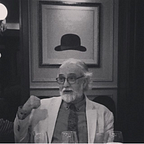Mr. Gilmore
With all of the talk of race, I’ve been thinking a lot about my experience growing up in San Jose, California, back when San Jose was known for orchards instead of silicon and software.
Most of San Jose, and certainly the part I grew up in, was pretty white. The east side of town was where the “Mexicans” lived. North of downtown was a section called Japantown that had managed to reform after the relocations during WWII. All of the gardeners and nurserymen in town were Japanese. There were a few Chinese and very, very few black people. The blacks were up in Oakland, San Francisco, Richmond, not Santa Clara Valley. Later, when I first bought a house in Santa Clara Valley I saw that the deed had a clause (no longer enforceable by then) prohibiting sale to blacks. My parents had of course inherited some racial attitudes, but there weren’t many occasions for them to pass them strongly on to me. I only saw black people occasionally on TV, and until the Civil Rights Movement, it would probably be someone like Louis Armstrong on a variety show. I remember once we were driving not far from our house in the family car with the dog and there was a black man walking down the street. We were all surprised, and probably stared at him. I don’t think I had seen a black man outside of TV before that. The dog went crazy barking at him, probably because she had ever seen anyone that looked like that before.
The first black man I ever actually met in person was a middle school music teacher. A friend played the cello and I thought maybe I wanted to as well, so Mr. Gilmore tried to show me how, putting little stars on the fingerboard for the notes I had learned. Later in 8th grade, Mr. Gilmore was my homeroom teacher for long enough to be recorded in this picture of me with my 8th-grade class.
I didn’t think all that much about it at the time because I was just a middle-schooler. But much later reflecting on it, what an unusual experience that was to have. The first black man I met was a gentle authority figure who was fond of classical music. It might have helped keep me from being overly susceptible to the negative stereotypes the culture imposed. I would love to be able to say that Mr. Gilmore was my favorite teacher and we got on famously, but it wasn’t like that. He was fine, he was just another teacher, I was just another of his students.
As the years have gone by it has dawned on me more and more what an experience that must have been for Mr. Gilmore, the only black teacher in an all-white school in an all-white suburban neighborhood. It was so easy for me, it could not have been easy for him. I feel bad that I never found out his story.
Update, January 2021: I’ve been meaning to update this story, but the update made me sad, so I have been avoiding it. I was finally able to find Mr. Gilmore’s obituary, published in February, 1993 in the San Jose Mercury News. It turns out that Donald Gilmore retired from teaching in 1992, then died early the next year at the age of 59. His musical passion was opera. He spoke four languages in addition to English; Spanish, French, Italian and German. Toward the end of his career he mostly taught Spanish. He never married, and had no children.
Here are some details from Donald Gilmore’s obituary that fill in more of a picture of the man than my childhood memories can:
- For three decades, Mr. Gilmore kept season tickets for the San Francisco Opera. Later he became a fan of San Jose Opera.
- He was an old-fashioned gentleman. For dinner, he always had a flower, a bottle of wine.
- His tape collection was enormous and it wasn’t just audio in opera, but also video, including every Star Trek program produced.
- When Mr. Gilmore’s tape collection was offered for sale, a prospective buyer said, “I would have loved to meet the man who bought all this.”
- Donald Gilmore was fond of saying, “If you can define it, you can measure it. If you can measure it, you can teach it.”
His obituary also mentions that memorial donations could be given to an organization known as the ARIS Project. A little research found that the A.R.I.S. stood for AIDS Reseach, Information, and Services. His cause of death at 59 was listed as a form of pneumonia, but I would guess that it was likely brought on by AIDS.
Mr. Gilmore the teacher was a gift that I didn’t know how to appreciate at the time. I wish I could have known Donald Gilmore the man.
